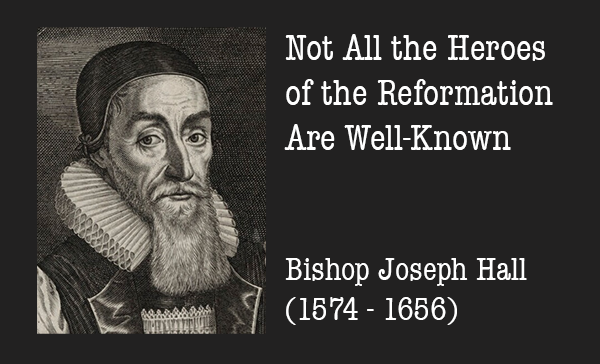
The Reformation was an ongoing event and not all the heroes of the Reformation are well-known. There were many unheralded champions even in locations we know well. On the eve of a contentious election taking place in an increasingly polarized culture, I would like to briefly introduce you to Bishop Joseph Hall, a hero from England who faced similar circumstances.
Joseph Hall was a third generation Reformer, coming of age in the late Elizabethan Age in England. He inherited the full theology and practice of the English Reformation: Cranmer’s 42 Articles and Book of Common Prayer, Episcopal Church government and the Elizabethan melding of Reformed Theology and Roman Catholic practice. Educated at Emmanuel College, Cambridge he enjoyed a fully Puritan pedigree but had no problem conforming to the existing situation within the English Church.
An astute theologian, Hall was one of the most well-known and beloved theological writers of the early 1600’s. His voluminous and creative literary output filled 12 volumes! The Puritans loved him. Yet today you will not find him listed among the important Puritan writers and you have to search diligently to find any of his writings. The reason for this literary vacuum harks back to Hall’s response to the polarization of English culture that led to the English Civil War.
With the accession of King James to the throne in 1603, Joseph Hall became a regular court preacher and his fame spread throughout the Reformed world. He was one of the English representatives at the Synod of Dort (1618) - hand-picked to represent English Calvinism by King James himself. Hall’s Biblical commentaries and theological essays were in great demand and his subtle political commentary, often included in his sermons and published writings, was appreciated by many who were concerned about the increasingly pro-Arminian policies of the monarchy.
With the accession of Charles I, the Arminian faction gained ascendancy. Charles promoted Arminians both within his circle of advisors and the Church hierarchy. The Calvinist Puritans were outraged by this theological betrayal of the Reformation and began an increasingly strident resistance against King Charles. This resistance led to a significant theological and cultural polarization within England.
Hall believed this confrontation between the Calvinist and Arminian camps would bring great harm to the Church of Christ and he determined to oppose it. He deliberately stood between the factions and urged the vital importance of unity within the Church of Christ. His essay, Via Media (i.e. “middle way”), even rephrased the Arminian position using Calvinistic terms. His stated intent was to bring the two sides closer together. But the essay was censored by the king’s order. So, when unexpectedly offered a bishopric Hall accepted, becoming the only Calvinist bishop appointed by Charles.
Bishop Hall openly used his position to promote the cause of church unity. He was determined to define and protect a middle way between the two increasingly hostile camps: the Puritans and those who supported the King. Tragically, his effort failed. Hall was reviled by his fellow Puritans as a compromiser and accused of “puritanisme” by both King Charles and Archbishop Laud. The accelerating cultural polarization obliterated Hall’s middle ground and his reputation and popularity became some of the first casualties of the English Civil War.
Yet by elevating the Church’s oneness in Christ above political considerations Hall remained true to Christ’s prayer, “that they may become perfectly one, so that the world may know that you sent me and loved them even as you loved me.” (John 17:23). Hall also provided us a valuable example of faithfulness to Christ in difficult times.
~ Pastor Steere







